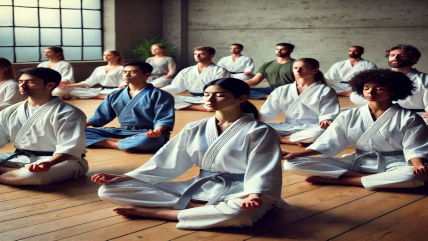Martial arts aren’t just about techniques and physical prowess; they are deeply rooted in a rich history and profound philosophy. Let’s explore the historical and philosophical foundations that form the bedrock of martial arts practices worldwide.
![]()
The Rich History of Martial Arts
Martial arts have evolved over centuries, with each tradition reflecting the culture and values of the society from which it originated. Ancient civilizations such as China, Japan, Korea, and India developed their unique styles, each with its own techniques, forms, and philosophies. From the Shaolin Monks’ disciplined Kung Fu training to the Samurai warriors’ Bushido code, these practices have been passed down through generations, preserving their rich heritage.
![]()
Emphasis on Respect and Discipline
Respect and discipline are cornerstones of martial arts philosophy. Practitioners are taught to respect their instructors, peers, and even their opponents. This respect extends beyond the dojo and is integrated into daily life, promoting harmonious interactions and ethical behavior. Discipline, both mental and physical, is cultivated through rigorous training and adherence to the principles of martial arts, fostering self-control and perseverance.
![]()
Self-Control and Honor
Martial arts place a significant emphasis on self-control. The ability to manage one’s emotions and reactions is critical in both training and real-life situations. By practicing self-control, martial artists develop the capacity to respond thoughtfully rather than react impulsively. Honor is another vital virtue, guiding practitioners to act with integrity and uphold the ethical standards of their martial tradition.
![]()
Courage and Loyalty
Courage and loyalty are deeply ingrained in martial arts philosophy. Practitioners are encouraged to face challenges and adversities with bravery, whether in combat or in everyday life. Loyalty to one’s school, instructor, and fellow students is paramount, creating a strong sense of community and mutual support. These values foster a spirit of unity and dedication within the martial arts community.
![]()
Personal Growth and Ethical Conduct
The ultimate goal of martial arts is not just physical proficiency but personal growth and ethical conduct. By embodying virtues such as respect, discipline, self-control, honor, courage, and loyalty, practitioners strive to become better individuals. Martial arts training encourages continuous self-improvement, both physically and mentally, leading to a more balanced and fulfilling life.
![]()
Philosophical Teachings
Many martial arts are influenced by philosophical teachings such as Confucianism, Taoism, and Buddhism. These philosophies emphasize harmony, balance, and the pursuit of wisdom. For example, Taoist principles of yielding and adaptability are evident in arts like Tai Chi, while Zen Buddhism’s focus on mindfulness and presence is integral to practices like Karate and Aikido.
![]()
The Role of Rituals and Traditions
Rituals and traditions play a significant role in martial arts, preserving the cultural heritage and reinforcing the philosophical foundations. Bowing, meditation, and the recitation of oaths or principles are common practices that instill a sense of respect, humility, and commitment. These rituals connect practitioners to the historical lineage of their art and remind them of the values they uphold.
![]()
Expanding on the Principles
Curious to delve deeper into the core principles of martial arts? Stay tuned! Over the next few posts, we will explore each principle in depth, uncovering their nuances and practical applications. From harmony and balance to strategic thinking, we’ll break down what these principles truly mean and how they can be integrated into your training and daily life.
For those eager to learn more, we also offer a FREE CHEAT SHEET on martial principles tailored to various martial arts systems. Feel free to view, print, or download it from our website. Whether you’re a seasoned practitioner or a curious beginner, this resource will enrich your understanding and practice of martial arts.

